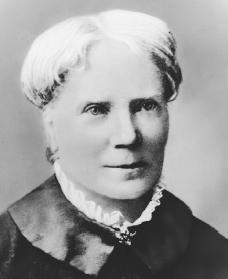Elizabeth Blackwell was born on February 3, 1821 in Bristol, England to Samuel Blackwell, a wealthy sugar merchant and Hanna Lane. She was the fourth of nine children. However, six of her siblings died during childhood. In addition, eight of her cousins died. This created the initial desire in Blackwell to become a doctor. When Blackwell was eight years old, a fire destroyed her father’s sugar refining business. As a result, her family left England for America. In 1837, they moved to Cincinnati, Ohio. However, the next year, Blackwell’s father died. As a result, at age sixteen, she had to open a small school for black children to support her family. When she was twenty-four, Blackwell visited her dying friend, Mary. Mary told her that she would have been spared from her worst suffering if only her doctor had been female. She then encouraged Blackwell to become a doctor. Blackwell credits this event with igniting her desire to become a doctor. After much rejection, Blackwell was finally accepted, though as a joke, to Geneva Medical College in western New York in 1847. The townspeople thought she was indecent and refused to talk to her. Despite this, through sheer determination, Blackwell graduated with high honors on January 23, 1849, becoming the first woman to earn a M.D. degree from an American medical school. After graduating, Blackwell worked in clinics in London and Paris for two years. She also studied midwifery where she contracted a disease that caused her to lose sight in one eye. As a result, she had to give up her dream of becoming a surgeon and returned to the U.S. in 1851. Blackwell then applied for a position at a dispensary, a store where medicine is bought, but was denied. Thus, she opened her own dispensary in 1853. Furthermore, in 1857, together with her sister, Dr. Emily Blackwell and Dr. Marie Zakrzewska, Blackwell opened the New York Infirmary for Women and Children. This was the first hospital for women run by women doctors. In addition, the infirmary created opportunities for women who were rejected internships elsewhere to obtain proper training. In 1867, it also opened a medical college for women. Blackwell also wrote many significant books such as Medicine as a Profession For Women, which was published in 1860 and Address on the Medical Education of Women, which was published in 1864. Afterwards, she received a letter from Europe asking her to bring same changes she created in the America. She agreed and returned to England in 1869. As promised, Blackwell brought significant change to the practice of medicine for women. Despite having to retire from practice in the late 1870s, she still campaigned for reform. Blackwell died on May 3, 1910 at the age of 89. |
Elizabeth Blackwell
|